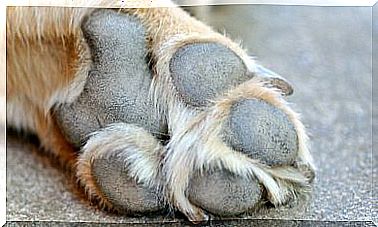Diseases Of Dogs That Are Dangerous To Humans

There are a number of dog diseases that you can get infected with. They are called zoonotic diseases. This technical term is used to describe any disease that can be transmitted from animals to humans.
The best known example of this is the famous and feared rabies.
It is possible to get infected with diseases from dogs , but the likelihood is rather low. But the risk is much higher if your immune system is weakened due to pre-existing illnesses.
Examples of this are people with HIV or AIDS, pregnant women, patients who are going through chemotherapy or the elderly.
People with chronic illnesses or an inherently weak immune system and those who have received organ or bone marrow transplants are also at risk.
The most common and dangerous diseases affecting dogs
Diseases in dogs: Capnocytophaga canimorsus
This bacteria is quite normal in the mouths of dogs and cats. Infections in humans are very rare, but should this happen, it can be potentially life-threatening. Infection occurs through bites or scratches.
Symptoms include blood poisoning, difficulty breathing, and meningitis.
Campylobacter jejuni
This is one of the most common causes of food poisoning. While the bacterium is normally passed on through undercooked meat, it can also exist in the feces of dogs and cats, where it can spread to humans.
Brucella canis
Brucellosis is a bacterial disease in dogs that can cause miscarriages and stillbirths in animals. It is passed on through vaginal secretions, urine, and saliva.
In humans, it can cause fever, fatigue, weight loss and inflammation of the liver, spleen and lymph glands.

Diseases in Dogs: Leptospira interrogans
This is a bacteria found in the urine of various pets. It can penetrate through the skin and into the bloodstream.
There it then causes fever, vomiting and diarrhea. If left untreated, it can cause kidney damage, meningitis, liver failure and even death in humans.
Ringworm
This is a disease in dogs that affects their skin, hair roots and, in some animals, even the claws. It occurs because of a fungus that is very contagious and that reproduces quickly
salmonellosis
This bacteria causes symptoms such as fatigue, gastroenteritis, vomiting, miscarriages, and septicemia. Dog owners should be separated from their animals during the acute phase of infection.
Giardia
This is an intestinal parasite that multiplies extremely quickly. Usually the disease is asymptomatic, which is why your dog could suffer and pass the parasite on to other dogs and people without you noticing.
Sometimes diarrhea occurs, but it doesn’t happen often. Some days the animal will have diarrhea, but not others. That’s why it’s so difficult to diagnose the disease.
Diseases in dogs: scabies
Scabies, also called scabies, is caused by a mite that lives in dust and the flora. They feed on the cells of the epithelia in the host’s skin.
It is a canine disease that has the potential to be transmitted to humans.
Should I hand in my dog if I belong to one of the risk groups?
No, definitely not! It just means that you should be extra careful with your furry friend.
There are also a lot of studies that show that pets are very beneficial to health, especially for people with chronic diseases.
There are even doctors who recommend their patients get a pet.

There are several steps you can take to keep yourself safe. You can have your pet’s health checked regularly to rule out any signs of illness.
Some hygiene rules, such as washing your hands after touching your pet, should of course already be in place. Avoiding direct contact with urine and feces are also measures that are very important.
Canine Disease Prevention
The best way to protect yourself from becoming infected with diseases from dogs is through hygiene and common sense.
In the following we have put together some more specific tips for you:
- Make sure your dog’s illnesses are treated in a timely manner. In any case, go to the vet if you notice that your fur nose is not feeling well or is behaving differently than usual. If your dog is sick, wash your hands after every contact with him.
- Make sure your dog is clean ! Bathe it regularly, watching for any signs of illness, especially skin damage or irritation.
- Give your puppy anti-parasite medication. Broad spectrum agents can prevent intestinal and other parasites.
- Don’t touch the dog poop while walking. Use gloves or a plastic bag to pick it up and throw it away.
- Give your dog their own food and drink bowl.
- Often times, clean the dog bed or basket and wash the bedding.
- Use flea and tick remedies regularly.
- Wash bites or scratches right away.
- Keep your pet indoors and don’t allow them to eat rubbish or drink from the toilet.
If you keep your fur nose healthy, you will also protect yourself from infection. It really depends on yourself to follow the advice and stay a little vigilant.









